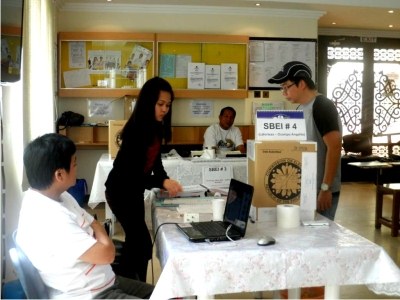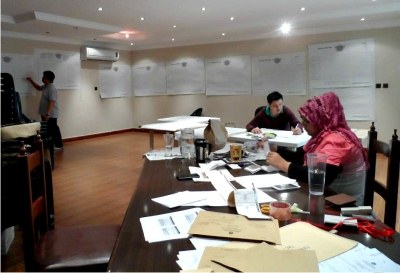| |
.. |
|
Voting in Doha, Qatar
|
|
from
NAMFREL Election Monitor Vol.3, No.1 |
|
by Maria Christina Pascual-Serafica, NAMFREL
Deputized Representative for Qatar |
|
. |
(Editor's note: These are excerpts
from the observation reports of Ms. Pascual. The voting in Doha took
place from April 13 to May 13, 2013 at the Philippine Embassy in
Doha. There were 23,260 registered voters in Qatar, or 11% of the
estimated 200,000 Filipinos in the country. Six special boards of
election inspectors (SBEIs) were formed to accommodate the voters.
The turnout was very low, at only 10%).
.
Voter turnout was low but this was
to be expected according to Vice-Consul Melvin C. Almonguera.
They were expecting a better turnout on the 2nd weekend of
the voting period. Vice-Consul Almonguera also added that he
knew that voters may find it a bit difficult to go the
embassy since there is no public transportation available in
that area. A voter may have to spend an average of QR50 (or
around PhP550) for a 10-km roundtrip fare to go the embassy.
Almonguera said that he would be very happy if 10,000 voters
would cast their votes by May 13.
In order to encourage a higher voter turnout among Filipinos
whose residence/place of work are based outside of Doha, the
embassy was arranging for the deployment of an SBEI team to
oversee the field voting at Al Khor (located 50 km north of
Doha).
|
|
 |
|
|
Field voting was conducted on April 26 at the Catholic
Church of Our Lady of the Rosary located 26 km away from the
Philippine Embassy. One of the embassy staff noted that
there was a good turnout of voters since the number of
ballots cast was in the double-digits.
In random conversations with the
Vice-Consul regarding the lack of interest among Filipinos
to cast their votes, the following are some of the reasons
which may have had an impact on the voter turnout:
|
-
|
Voters are not that
excited to vote for senators
and party-list
representatives. Filipinos
are more inclined to vote
during Presidential
Elections. |
|
- |
Filipina domestic
helpers are usually not
allowed by their employers
to leave the house even on
weekends. If they have to go
on errands to remit money to
their families, go to the
embassy to renew a passport
or secure an
overseas employment
certificate, the employer
usually goes with them. It’s
also possible that the
employer might
ignore their request to cast
their vote at the embassy
simply because they don’t
think that it’s necessary or
it’s
just a waste of time.
|
|
-
|
It’s not that easy to take a
day off during weekdays to
go the embassy especially
among those working outside
of Doha. |
|
-
|
It’s too costly to go to the
embassy if you’re earning an
average of QR3,000 per month
(QR100/daily wage).
Roundtrip fare for a private
taxi would set you back
between QR30 to QR100
depending on your location. |
|
-
|
Workers who are based in Ras
Laffan, Al Khor, and
Mesaieed (where the oil
refineries are located) are
usually ferried to the city
every Friday so that they
can do their shopping or
just to laze around the
city. However, the company
buses have a very strict
time schedule and if you
miss it, you have to shell
out money for the cab fare
or hitch a ride back to your
place of work which may be
50 to 100 km away from the
capital. Given a choice of
doing your chores or going
to the embassy, people may
opt to just skip voting
altogether. An ideal
solution to this problem
would be to offer free
shuttle services from the
Central Bus Station (where
most workers are dropped
off) to the embassy.
However, it would also be
difficult for the embassy
and for Filipino
organizations to do this
since the local police might
misconstrue such service as
an “illegal taxicab
operation.” There is a
crackdown on private
vehicles being used to ferry
passengers and volunteers
might face hefty fines or
their driver’s license might
be revoked if caught by the
local police. |
(On April 27, Saturday) one voter became upset when
he was told that he could only cast his vote but he could
not collect his passport since all consular services are
done during weekdays. He said that his employer would not
allow him to take a day-off during weekdays as they are
undermanned and he hoped that he could collect his passport
and cast his vote at the same time. He pointed out that it
was too costly for him to make two trips to the embassy.
Recommendation: In a place like Doha, where most employees
have embassy staff could give consideration to voters who
would like to cast their votes and collect their passports
at the same time. It would be especially helpful to voters
who have to make a 50-100 km trip to the embassy. The
embassy staff can do this on a case-to-case basis.
Information dissemination on the overseas absentee voting
was mainly done through the Filipino organizations in Qatar.
Meanwhile, voters relied on ABS-CBN’s The Filipino Channel
(TFC) for information on candidates. In my interviews with
some of the voters, most of them claimed that their primary
sources of information about the elections and candidates
were TFC and Facebook posts of friends and relatives. Many
were not familiar with the candidates especially those
running for party-list representatives. A few voters were
dismayed that the certified list of party-list candidates
was several pages long and they only had to choose one
candidate from the list. At least one voter admitted that he
only chose from the first page of the candidates’ list since
he did not realize that the other pages also contained the
names of the other party-list organizations.
A few voters asked the SBEIs which positions will be voted
for. They were surprised to find out that they will only
vote for 12 senators and 1 party-list representative. Some
remarked “ay, walang local positions?"
. |
 |
.. |
One of the difficulties
faced by the embassy
personnel was the shortage
of election paraphernalia
supplied by Comelec. For
example, the seals provided
for the ballot boxes were
insufficient. What the SBEI
did was to use the original
Comelec seal on the lid
where the valid ballots were
placed while a photocopy of
the seal was just pasted on
the lid where the spoiled
ballots and ballot coupons
were placed. The number of
Certified List of Overseas
Voters was also insufficient
according to Vice Consul
Almonguera. The embassy
staff just downloaded the
list of voters for Qatar as
posted in the Comelec
website.
Some voters were turned away
since their names were not
on the Certified List of
Overseas Absentee Voters
(CLOAV). There were cases
where the voter registered
at the POEA prior to his
deployment to Qatar but his
name was not included in the
CLOAV. |
|
|
|
|
Others mistakenly thought that they could
cast their votes since they were already registered voters in the
Philippines. It seems that they were not aware that they had to
apply as an overseas absentee voter and that they had to request
Comelec to transfer their voting records to Qatar.
Unlike in 2010 when the ballot boxes were transported to the
Philippine School in Doha for the canvassing of votes, this time the
canvassing took place at the embassy’s premises. The embassy just
moved to a new and larger villa and there was sufficient space to
count all the ballots for the 6 SBEIs. On the first day of voting,
five supporters of senatorial candidate Bro. Eddie Villanueva
arrived at the embassy wearing shirts emblazoned with the words
“Bro. Eddie Villanueva for Senator.” Vice-Consul Almonguera
immediately requested the group to remove/change their shirts before
entering the polling station.
Two volunteers of the Kalinga Party-List were seen distributing
campaign flyers to voters a few meters away from the embassy
premises. I informed one of the embassy staff about the Kalinga
Party List and I was surprised by his response. He said that they
couldn't do anything about it since the volunteers were outside the
embassy premises and technically speaking, they have no jurisdiction
beyond the embassy’s gates since that is already part of the State
of Qatar.
(I personally observed on May 13) a volunteer from Kalinga Party
List distributing flyers outside the embassy. He asked me whether I
was going to vote, and handed me one of the flyers. I informed him
that I was actually from Namfrel and I would note down his presence
in my report. When I tried to take his photo, he hid behind the
cabin of the embassy’s security detail. A few minutes later, the
Kalinga Party List volunteer finally left. |
|
|
| |
.
.
. |
|
| |
| |
|
|

